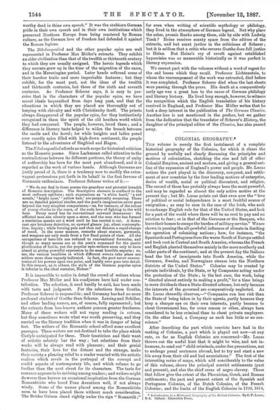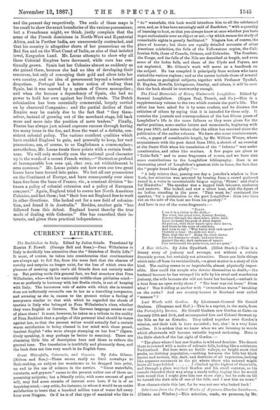COLONIAL GEOGRAPHY.*
Tun volume is merely the first instalment of a complete historical geography of the Colonies, for which it clears the ground by usefully and clearly discussing the principles and motives of colonisation, sketching the rise and fall of other Colonial Empires, ancient and modern, and giving a general out- line of the expansion of England's power and people. Mr. Lucas notices the part played in the discovery, conquest, and settle- ment of new countries by the four leading motives of enterprise, desire of wealth, social or political discontent, and religion. The second of these has probably always been the most powerful, and may be regarded as almost the only active motive at the present day ; but Mr. Lucas points out that even now the "love of political or social independence is a most fruitful source of emigration ; as may be seen in the case of the Irish, who seek to exchange English rule for that of the United States, and look for a part of the world where there will be no rent to pay and no eviction to fear ; or in that of the Germans or the Basques, who leavetheir homes to escape the burden of military service." We are shown in passing the all.powbrful influence of climate in limiting the operation of colonising nations ; how, for instance, "the Spaniards and Portuguese from the warm South of Europe settled and took root in Central and South America, whereas-the French and English planted themselves mainly in the more northerly and colder parts of the continent ; and at the present day the Italians head the list of immigrants into South America, while the Germans, Swedes, and Norwegians stream into the Northern districts of the United States." Colonies may be created by private individnals, by the State, or by. Companies acting under the protection of the State; in the last case, the work, being "directed almost entirely to making a profit," for a time brings in more dividends than a State-directed scheme, but only because the interests of the governed are comparatively neglected. As Mr. Lucas shrewdly observes,—" Companies run less risk than the State of being taken in by their agents, partly because they keep a sharper eye on their own interests, partly because to cheat Government has, for some reason or other, always been considered to be less criminal than to cheat private employers. On the other band, a Company as such has little or no con- science."
After describing the part which convicts have had in the making of Colonies, a part which is played out now—at any rate, so far as English Colonies are concerned—Mr. Lucas throws out the useful hint that it might be wise, and not in- humane, to send not "child criminals, under due precautions, not to undergo penal sentences abroad, but to try and start a new life away from their old and bad associations." The first of the interesting series of maps, which add considerably to the value of this volume, shows the principal convict settlements (past and present), and also the chief areas of negro slavery. Those that follow give the extent of the Phcenician, Greek, and Roman settlements ; the past and present extent of the Spanish and Portuguese Colonies, of the Dutch Colonies, of the French Colonies; and the limits of the English Colonies in 1700, 1814, • introduction to a Historical G.graphy of the British Colonies. By O. P. Lome. BA. Oxford Clarendon Press. and the present day respectively. The scale of these maps is too small to show the exact boundaries of the various possessions; but a Frenchman might, we think, justly complain that the areas of the French dominions in North-West and Equatorial Africa, and in Further India, are unnecessarily contracted, and that his country is altogether shorn of her possessions on the Bed Sea and on the West Coast of India, as also of that isolated jewel, Kerguelen Land. Mr. Lucas attempts to show why all these Colonial Empires have decreased, while ours has con- tinually grown. Spain lost her Colonies almost as suddenly as she gained them, because she had no idea of developing their resources, but only of conveying their gold and silver into her own country, and no idea of government beyond a benevolent despotism. Portugal had a better notion of trading than Spain, but it was marred by a system of Crown monopolies ; and when she became a dependency of Spain, she had no power to hold her own against her Dutch rivals. The Dutch colonisation has been essentially commercial, largely carried on by chartered Companies ; and the partial decline of their Empire may be mainly due to the fact that "they them- selves, instead of growing out of the merchant stage, fell back more and more into the position of mere traders." Finally, France has always just missed supreme success through having too many irons in the fire, and from the want of a definite, con- sistent colonial policy. The various excellent qualities which have enabled England to gain, and generally to keep, her vast possessions, are, of course, to us Englishmen a commonplace; nevertheless, Mr. Lucas treats these points with a certain fresh- ness. We will only modestly sum the national good character up in the words of a recent French writer,—"Surtout ee profond et incomparable bon sena qui, chez eux, eat veritablement le aens common." Mr. Lucas points out how even our two great losses have been turned into gains. We lost all our possessions on the Continent of Europe, and have consequently ever since been free from the bane of Prance, viz., a constant division "be- tween a policy of colonial extension and a policy of European ,conquest." Again, England tried to coerce her North American Colonies, and lost them ; but" their loss set England free to work in other directions. She looked out for a new field of colonisa- tion, and found it in Australia." Besides, another gain "has followed from this defeat. England learnt thereby the true mode of dealing with Colonies." She has consulted their in- terests, and given them practical independence.

































 Previous page
Previous page